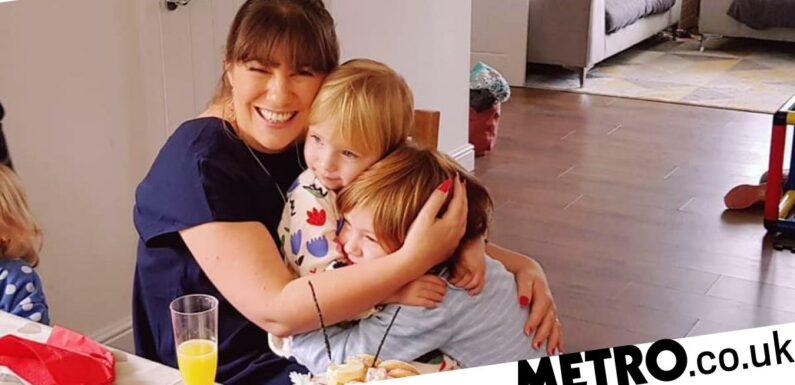
Sitting down next to my three-year-old daughter, I stroked her hand.
‘Immy, I’m sorry, sweetheart,’ I said. ‘We’re running late and I just wanted you to put your shoes on but I shouldn’t have shouted at you.’
My little girl threw her arms around my neck and instantly, I felt better.
I always try to be calm and reasonable with my two children – Immy and her five-year-old brother Theo – and keep my temper in check. But there are times when, despite all of my good intentions, the situation gets the better of me and I end up shouting.
Like this morning, when I’d asked Immy no less than four times to put her shoes on, as I’d dashed about, grabbing her coat and bag, throwing clothes in the washing machine and trying to make sure we’d all had breakfast.
My Little Miss Independent never lets me help her put her clothes on anymore so it’s not like I could even do it myself. But as I saw her picking up her toy animals yet again, I snapped. ‘Immy!’ I yelled. ‘I’ve told you – put your shoes on!’
At my harsh tone, she’d burst into tears and instantly my anger dissolved into guilt. Of course it wasn’t her fault we were running late – she was only three, she had no concept of time. If I hadn’t been trying to do a million and one things before getting out of the door, I wouldn’t have felt so stressed and taken it out on her.
So, after taking a deep breath, I sat down on the stairs next to her and apologised.
Just like I would to any adult – or indeed any person of any age – who I’d spoken to in such a manner. I think it’s just as important to recognise your wrong-doings to your little ones and let them know if you regret your words or actions.
‘Sorry’ hasn’t always been a word I’ve been comfortable with. As a teenager and even into my early 20s, I found it really hard to admit that I was in the wrong.
With friends, family members and especially boyfriends, I would continue arguing my point, until they finally came round to my way of thinking or, more probably, got bored of bickering with me. It wasn’t until my ex told me outright, ‘I don’t know why you find it so hard to say sorry,’ that I realised I was doing it.
I became so much more conscious of what I was saying – and how I was saying it – from that moment and, although it wasn’t easy, I always made a point of recognising, both to myself and others, when I had been impolite. Or downright rude in some cases.
To be honest, as I’d matured and met my husband Tom, the need became far less. We were happy together and hardly ever found fault with one another. This may be because he is an extremely placid person who doesn’t have an argumentative bone in his body, but I digress.
It was only when Theo and Immy came along when it became an issue again. Fuelled by a lack of sleep and dealing with unreasonable toddlers, I found my temper flaring in a way it hadn’t for years.
It wasn’t over big things, admittedly. At two, Theo went through a stage of only wearing the same two outfits – including socks – for about a month and would become hysterical if I even suggested something different.
Immy, with her fiercely independent streak, has insisted on doing everything for herself for as long as I can remember. Even when – like taking off her tops and zipping up her coat – she physically couldn’t.
And like most toddlers, they’d happily only hear whatever they wanted, whenever it suited them.
Now normally, these are nothing more than minor inconveniences, something to roll your eyes at, maybe even smile over.
However, on a bad day, when you’ve been up multiple times during the night, you’re facing a busy day at work and it’s the millionth time they appear to be purposefully ignoring you… well, it’s a different story.
In that moment, it’s far too easy to let your frustration out. Loudly.
That’s when I was glad that I’d had some practice in saying sorry. Because, seeing their little faces drop at my raised voice, left no question that I had to apologise and make amends for losing my cool.
And not only did I want to let them know I regretted what I’d said, I wanted to show them that there was nothing wrong with admitting that you were in the wrong. Plus, that I am big enough to admit my mistakes. And hopefully, in time, they will too.
It’s something I felt even more grateful for doing when I read American therapist Whitney Goodman’s thoughts on the importance of parents saying sorry to their children.
‘Growing up with a parent who cannot or will not apologise can be one of the most disorienting and confusing experiences for both a child and an adult,’ she explained on her Instagram account.
‘That’s because no one out there, not even parents, is absolved from their responsibility to acknowledge their part in something, apologise, and try to do better.’
Hear, hear!
She added that, if you don’t, your children may ‘doubt’ or ‘blame themselves’ for things you’ve done wrong. And that’s certainly not what I want.
So the professional has confirmed it. Although sorry may be the hardest word, it is also one of the most important.
Do you have a story you’d like to share? Get in touch by emailing [email protected].
Share your views in the comments below.
Source: Read Full Article

